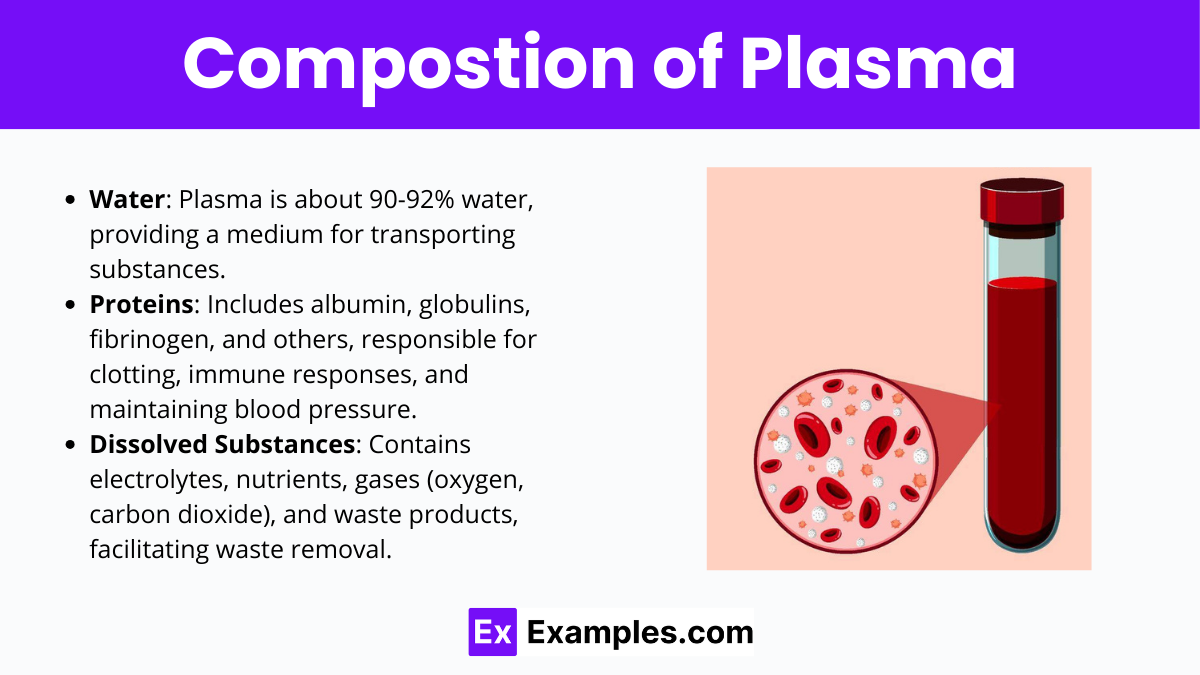Which of the following is the primary component of plasma?
Red blood cells
White blood cells
Platelets
Water


Plasma, often overlooked, is the liquid powerhouse of our blood, making up over half of its volume. This pale yellow fluid not only transports red and white blood cells and platelets throughout our body but also delivers vital nutrients, hormones, and proteins to where they’re needed most. Beyond nourishment, plasma plays a crucial role in waste removal, ensuring our cells remain healthy and functioning optimally.
Plasma, the liquid portion of blood, plays a crucial role in various medical treatments. It’s rich in proteins and antibodies, making it essential for treating blood disorders, immune deficiencies, and critical conditions such as burns and shock. Doctors also use plasma for its clotting factors, which are vital for patients with hemophilia or those undergoing complex surgeries. Beyond treatment, plasma’s role in medical research continues to expand, offering hope for new therapies and cures.

Water, the primary constituent of plasma, accounts for about 90-92% of its volume. This high water content is essential for dissolving and transporting various substances throughout the body. Water in plasma:
Plasma proteins, comprising 6-8% of the plasma, play pivotal roles in various bodily functions. The liver primarily produces these proteins, which include:
Electrolytes in plasma, including sodium, potassium, calcium, magnesium, chloride, bicarbonate, and phosphate ions, play vital roles in:
Plasma transports various nutrients from the digestive tract to cells throughout the body. These include:
The primary gases dissolved in plasma are oxygen (O2) and carbon dioxide (CO2). The plasma carries oxygen from the lungs to the body’s tissues and carbon dioxide from the tissues back to the lungs for exhalation.
Plasma also acts as a vehicle for removing waste products from cellular metabolism, such as urea and creatinine, transporting them to the kidneys for excretion.
Endocrine glands produce hormones and release them into the plasma, which transports them to target organs or cells. There, they exert their specific regulatory effects on growth, metabolism, and homeostasis.
Plasma keeps you healthy by carrying nutrients and hormones to your cells and taking away waste. It has special proteins that help fight infections and clot blood, preventing excessive bleeding. By balancing water and electrolytes, plasma ensures your body’s cells work properly, supporting overall health and helping you recover from injuries and illnesses.
Donating plasma involves a process where a machine collects the liquid part of your blood, the plasma, and returns the rest to your body. It’s a safe and generous way to help others, as medical professionals use donated plasma to treat various illnesses. The donation takes about an hour, and you can often donate multiple times a year, providing a vital resource for healthcare treatments.
Plasma deficiency occurs when your blood lacks enough plasma, the liquid part of the blood that carries cells, proteins, and other essential substances throughout your body. This condition can lead to various health issues, depending on what specific components of the plasma are in deficit. Let’s break down the causes, symptoms, and potential impacts of plasma deficiency.
Several factors can lead to plasma deficiency, including:
Plasma deficiency can cause a range of symptoms, varying from mild to severe, such as:
Addressing plasma deficiency often involves treating the underlying cause. For example, increasing fluid intake can help if dehydration is the issue, while improving nutrition can boost plasma protein levels. In more severe cases, medical treatments such as plasma transfusions or supplements might be necessary.
Preventing plasma deficiency mainly involves maintaining a healthy lifestyle, including a balanced diet rich in proteins and vitamins, staying hydrated, and managing chronic conditions that might affect plasma levels.
Plasma transports nutrients, hormones, and proteins, maintaining blood pressure and volume, crucial for bodily functions.
Having plasma means your blood can carry cells, nutrients, and waste, ensuring your body’s systemic balance.
Yes, plasma is essential for transporting substances, regulating body temperature, and supporting immune functions.
Blood plasma comes from water, salts, and proteins, produced by dietary intake and liver synthesis.
Diseases like hemophilia and immune deficiencies are directly related to blood plasma abnormalities.
Text prompt
Add Tone
10 Examples of Public speaking
20 Examples of Gas lighting
Which of the following is the primary component of plasma?
Red blood cells
White blood cells
Platelets
Water
Plasma is a part of which bodily system?
Nervous system
Digestive system
Circulatory system
Muscular system
Which of the following substances is NOT commonly found in plasma?
Glucose
Hormones
Hemoglobin
Electrolytes
Plasma helps in the transportation of:
Oxygen
Carbon dioxide
Nutrients and waste products
All of the above
What is the function of plasma proteins such as albumin?
Oxygen transport
Immune response
Maintaining osmotic pressure
Blood clotting
Plasma makes up approximately what percentage of total blood volume?
20%
45%
55%
70%
Which plasma protein is essential for blood clotting?
Fibrinogen
Globulin
Albumin
Hemoglobin
Plasma without clotting factors is known as:
Serum
Lymph
Hemoglobin
Hematocrit
Which of the following ions is most abundant in plasma?
Potassium
Sodium
Calcium
Magnesium
Plasma's role in the immune system is primarily through:
Red blood cells
White blood cells
Plasma proteins like antibodies
Platelets
Before you leave, take our quick quiz to enhance your learning!

